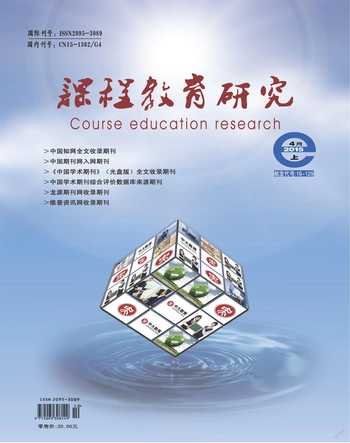An Interpretation of Chinese Teaching Responsibilities
2015-05-30李傲君张文星
李傲君 张文星
【项目来源】北京服装学院人事处促进人才培养综合改革项目,项目编号:PTTBIFT_YC?鄄005。
【中图分类号】G64 【文献标识码】A 【文章编号】2095-3089(2015)04-0092-02
When comes to teaching in Chinese classroom, a collage of arguments always arise. Some say in order to “revolute” Chinese students, western ways of teaching have to take the lead, as it does more in evoking students thinking. However, people have to dig into Chinese teachers tremendous responsibilities before the critics.
In the film Spiderman there is the line: “With great power comes great responsibility.” This is quite true for Chinese teachers. If we look at the embodiments of Chinese teachers authority from another perspective, we will see that teachers authority can also convert to their responsibility. Disciplining students takes teachers time and efforts; lecturing without questioning asks teachers to prepare more before classes and all the assignments need to be corrected by teachers. To a certain degree, the more authority the teacher has, the more responsibility he/she has. Like anywhere else it is not easy to be a qualified teacher in China. Besides all the other responsibilities, Chinese teachers also have two distinctive ones.
1.Teachers need to be models for their students. Their behavior should be proper for their identities. Chinese teachers school is called Shi Fan College. There is a slogan for these schools “To be knowledgeable in order to be an instructor (Shi), to be moral in order to be a model (Fan).” Teachers not only transmit knowledge to students, but teach students how to be proper citizens as well. Research shows that teachers in China believe that they not only have the role of “cultivating” their students cognitive development but promoting positive attitudes to society and responsible moral behavior as well. The Chinese teacher is expected to be a good moral role model in all areas of life (this in China is known as “Wei Ren Shi Biao”).
2.Chinese teachers give students more care outside classes. “Hong Kong teachers tend to be authoritarian compared to Australian teachers, but outside the class they are caring about their students, often contacting the home, for example, which Australian teachers would do rarely” (Biggs, 2001, p299). When we were in elementary school, in the publications of elementary students Chinese writings, there were always some moving stories about the relations between teachers and students.
In China there is a saying “being a teacher one day, being a father for the rest of my life”. Although it looks like exaggeration, it shows what kind position a teacher is in a persons heart. “Hong Kong students display almost unquestioning acceptance of the knowledge of the teacher or lecture. This may be explained in terms of an extension or transfer of the Confucian ethic of filial piety” (Biggs, 1996, p47). From this point of view teachers are like fathers.
After explaining the causes of Chinese teachers authority, the embodiment of Chinese teachers authority and the responsibilities Chinese teachers carrying related to their authority, we would like to analyze Confucius idea about teachers image which we assume is the root for Chinese teachers authoritative image.
We consider the above mini phenomenological study give our interpretation of Chinese teachers image more meaning. Also as individual teacher, one persons teaching may differ greatly from the other who is from the same cultural background.
Works Cited:
[1]Bosworth & Kris (1995). Caring For Others And Being Cared For. Phi Delta Kappan, 0031-7217, 76, (9), 1-10.
[2]Biggs, J. B. (2001). Teaching across cultures. In Salii. F, Chiu, C. Y. & Hong. Y. Y. Student motivation: The culture and context of learning. New York: Kluwer Academic/ Plenum Publishers.
[3]Biggs, J. B. (1996). Western misperceptions of the Confucian-heritage learning culture. In In D. Watkins & J. Biggs (Eds.), The Chinese learner: Cultural, psychological, and contextual influences. Hong Kong: Comparative Education Research Center.
[4]Bull, P. (Producer), & Bull, P. & Gibney, A. (Writers) (1992). Big business and the ghost of Confucius [Videorecording]. Seattle: Pacific Basin Institute in association with KCTS.
[5]Cassidy W.& Bates, A. (2005) “Drops-Outs” and “ Push-Outs”: Finding Hope at a School That Actualize the Ethic of Care. American Journal of Education 112 (November), 66-109.
[6]DRCNET.(n.d).Retrieve Nov.18,2006,from http://www.drcnet.com.cn/DRCNet.Channel.Web/Subject/sc2006_sm1.htm.
[7]Hayes, C. B., Alice, R., & Elain B. Z. (1994). The Middle Schools Childs Perceptions of Caring Teachers. American Journal of Education 103 (November), 1-17.
[8]Huang,C.(1997).The analects of Confucius. New York: Oxford University Press, Inc.
[9]Kopels,S.(Producer & director)(1998),Ching,J.(Script). Confucianism & Taoism. [Videorecording]. LA: Greenstar Television.
[10]Lee,W.O.(1996).The cultural context for Chinese learners: Conceptions of learning in the Confucian tradition. In D. Watkins & J.Biggs(Eds.),The Chinese learner: Cultural, psychological, and contextual influences.Hong Kong:Comparative Education Research Center.
[11]Vygotsky, L.S.(1978).Mind in Society:The Development of Higher Psychology Processes. Cambridge, MA: Harvard University Press.
[12]Watkins,D.(2003).Teacher thinking and practice from a Chinese cultural perspective. In F. Slili & R. Hoosains (Eds.), Teaching, learning, and motivation in multicultural context. Connecticut: Information Age Publishing.
[13]Wang,Y&Lu,N.(Sept. 2006). Ten teachers were dead for saving students from 2005. retrieved on Nov. 10th, 2006, from Xinhua News Agency website: (http://news3.xinhuanet.com/edu/2006-09/13/content_5087420.htm.
[14]Ziskin,L.&Bryce,I.(Producers),&Raimi,S.(Director).(2002). Spider-Man.[Motion Picture].Calif.:Columbia TriStar Home Ente?鄄rtainment.
